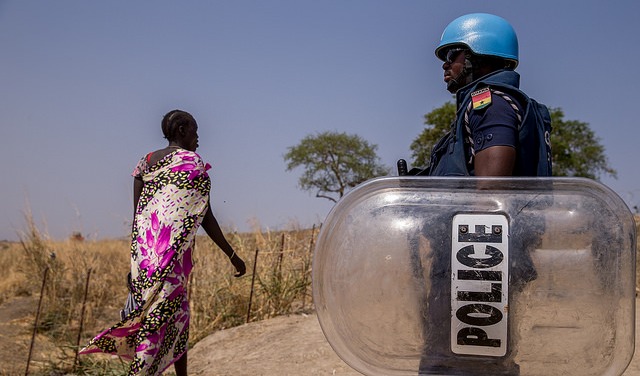UN demands end to sexual violence in war-torn S. Sudan

May 4, 2017 (JUBA) – South Sudan should end conflict-related sexual violence to ensure effective functioning of special protection units on sexual and gender-based violence in the police to hold perpetrators to account and to respect the sanctity of protection of civilians sites, the United Nations Secretary-General said in a report to be presented to the Security Council on 15 May.
The 33-page report reviews 13 conflict settings, four post-conflict countries and two additional situations of concern, blaming the government and non-government actors for either committing or being responsible for patterns of rape or other forms of sexual violence.
In 2016, it said, sexual violence continued to be employed as a tactic of war, with widespread and strategic rapes, including mass rapes, allegedly committed by several parties to armed conflict, mostly in conjunction with other crimes such as killing, looting, pillage, forced displacement and arbitrary detention.
“The strategic nature of the violence was evident in the selective targeting of victims from opposing ethnic, religious or political groups, mirroring the fault lines of the wider conflict or crisis,” it reads.
“Shame and stigma are integral to the logic of sexual violence being employed as a tactic of war or terrorism: aggressors understand that this type of crime can turn victims into outcasts, thus unravelling the family and kinship ties that hold communities together,” it adds.
A U.N had, in the past, given horrific accounts of civilian killings and a rise in the number of armed elements gang-raping women and girls who have taken refuge in the U.N protection of civilian sites.
According to the U.N report, for instance, in 2016, the U.N Mission in South Sudan (UNMISS) documented 577 incidents of conflict-related sexual violence, including rape, gang rape and sexual slavery.
The survivors, it stated, included 57 girls, several of whom were below 10 years of age, with two being less than one year old. In addition, service providers recorded 376 cases of sexual violence, of which 157 were forced marriage, with State and non-State armed actors among the alleged perpetrators.
“Overall trends point to an alarming increase in the number of rapes, with 20 percent more victims seeking services following sexual assault. The period under review also saw a 32 percent increase in the number of cases of gender-based violence perpetrated by men in uniform, as compared with 2015,” stressed the report.
The pattern of perpetrators and victims coming from rival ethnic groups persists, with insults often levelled, during attacks, at the victim’s ethnicity or perceived allegiance, it adds.
The report says the greatest frequency and severity of recorded crimes occurred in July 2016, in connection with active hostilities. Ethnic targeting, together with that of pregnant women, children and the elderly, in violation of social taboos, indicates that sexual violence is being used as part of retaliation strategies intended to punish communities.
Cited in a number of violations are members of the South Sudanese National Police Service. For example, of the cases of conflict-related sexual violence recorded by UNMISS, 217 were reportedly committed between 8 and 25 July, with most occurring at Sudan People’s Liberation Army checkpoints near camps, which are designated as protection of civilians sites.
“Those affected were generally displaced Nuer women and girls, with the majority of perpetrators being members of the Sudan People’s Liberation Army, although some women also reported attacks by armed youth affiliated with the Sudan People’s Liberation Movement/Army-in-Opposition,” observes the U.N report.
Several incidents were also documented in November in Central Equatoria State, allegedly perpetrated by South Sudan army forces.
Despite preventive measures by UNMISS, conflict-related sexual violence persists in proximity to UN protection of civilian sites, it added.
The report says successive ceasefire agreements since 2014 have failed to curb the behaviour of combatants, and sexual violence continue to deepen insecurity, delaying peace and reconciliation.
(ST)
